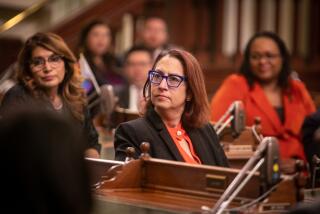Democrats seeking office have their eye on Sacramento
WASHINGTON — Early this year, Leticia Perez and her husband flew here for a whirlwind 48 hours. The couple dined at the Italian Embassy, visited the Lincoln Memorial and joined the crowd on the National Mall watching as President Obama was inaugurated for a second term.
Their host was the Democratic Congressional Campaign Committee, which hoped to persuade Perez, a Kern County supervisor, to run for a Central Valley congressional seat.
But a few weeks later, Perez ignored the entreaties from Washington when a spot in the state Senate unexpectedly opened up. The trip from the state capital to the Senate district, a 2 1/2-hour drive, was far more enticing than the cross-country flight between California and Capitol Hill, especially with a 2-year-old at home.
Perez was also convinced she could accomplish more in Sacramento — where Democrats hold the governorship and a two-thirds legislative majority — than in Washington, where she would be a member of the House minority. “I feel at this time and place, the state is where I can be most effective,” said Perez, one of five candidates in the May 21 special election.
After years of budget misery, public opprobrium and term-limit-induced turnover, Sacramento is starting to look a lot more attractive to Democratic lawmakers and candidates, who once might have viewed a seat in Congress as the higher, more desirable rung on the political ladder. (A voter-passed change in term limits, allowing legislators to serve 12 years in a single chamber, is another reason staying put has grown more appealing.)
“If you want to be on MSNBC … or quoted in Roll Call” — the Capitol Hill newspaper — then Congress is “a good place to be,” said state Sen. Kevin de Leon, a Democrat from Los Angeles who is favored to become the Senate’s next leader. The Legislature is far better, he said, “if you want to get real, tangible things done.”
He cites legislation creating the first state-run individual retirement program, which has brought De Leon national attention. Over the years, many other laws passed in Sacramento — on issues including family leave, clean air and consumer protection — have served as a model for Washington.
No congressional seat sits empty in California for want of interested candidates, Democrat or Republican. But with recruiting for the midterm elections underway and those races slowly taking shape, there has been no rush for the exits among Sacramento Democrats, even as more competitive primaries and a redrawing of political boundaries have loosened the hammerlock incumbents once held over their congressional seats.
“For all the criticism, much of it legitimate, over the last number of years when we were in the throes of the terrible deficit, look where we stand now,” said state Sen. President Darrell Steinberg, a Democrat from Sacramento who spoke with Perez as she weighed her choices. “We’re not perfect, but we’ve got a balanced budget, we’ve made deep cuts, we’ve passed a tax increase. We’re on the verge of turning it around, and so that’s a selling point.”
(For Republicans, the political dynamic is precisely the opposite. Democratic domination in Sacramento threatens to marginalize any Republican elected to the Senate or Assembly, while the GOP majority in the House of Representatives is an attraction. “You go to Congress and you’re part of a majority that’s likely to exist through the decade,” said Rob Stutzman, a veteran GOP strategist, who lamented the difficulty of attracting top-flight legislative candidates.)
Congress used to be the place where many of Sacramento’s most gifted and ambitious Democratic lawmakers — Philip Burton, Howard Berman and Henry Waxman among them — went to make their mark. The chance to serve in the congressional majority and build clout — the party controlled the House for 40 years, ending in 1995 — helped ease some of the hardship of living and working 3,000 miles from home.
Vic Fazio spent 20 years on Capitol Hill representing the Sacramento area after starting his political career in the California Assembly. The Democrat recalls without fondness the countless hours flying back and forth and having to choose on weekends between “going to your daughter’s soccer game or going off to the county fair, or whatever event your political life required.”
“It’s a very tiring kind of existence,” said Fazio, now a Washington lobbyist.
The sacrifice is far less attractive when the reward is serving in the minority, especially for lawmakers who, after about a year or so in Sacramento, have catapulted into leadership positions. California’s 38-member Democratic House delegation includes a former Assembly speaker, an ex-Senate majority leader and a number of former committee chiefs.
“That is a little bit of a culture shock,” said Democrat Julia Brownley of Oak Park, who spent six years in the Assembly and headed the Education Committee before winning a Ventura County congressional seat in November.
Rep. Jackie Speier, a Hillsborough Democrat who had hundreds of bills signed into law during 18 years in Sacramento — many by Republican governors — said pursuing policy goals in Congress “can be quite disheartening.”
“It doesn’t matter how talented you are,” she said. “It doesn’t matter if you have a good idea for a bill.... You can get, as I did the last session, 131 co-sponsors on a piece of legislation and I couldn’t get a hearing.”
Some have adapted better than others. “A lot of it is just finding the way to accomplish legislative ends and help your constituents in an environment where you’re not only in the minority, but it’s a very polarized, dysfunctional place,” said Rep. Adam B. Schiff, a seven-term Democrat from Burbank, who chaired the Senate Judiciary Committee during his years in Sacramento.
Liz Figueroa thinks she has a better idea.
The former Democratic state lawmaker from Fremont teaches part-time in the government program at UC Berkeley. When students and aspiring officeholders ask about a career in politics, she steers them away from Washington and toward Sacramento, where, she says, they can have a much greater impact.
“It’s the size of our state and the largeness of our economy that makes others pay attention,” she said via email. “Better to be the large fish in the small pond.”
Barabak reported from Sacramento and Simon from Washington.
More to Read
Sign up for Essential California
The most important California stories and recommendations in your inbox every morning.
You may occasionally receive promotional content from the Los Angeles Times.












